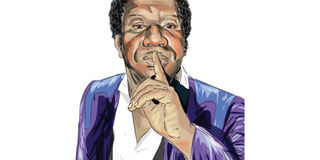Rumba fans set to mark second anniversary of Tabu Ley’s death

Tabu Ley’s name ranks up there with Franco when one talks about music from Congo DR. He begun his musical career with one of Congo’s biggest bands, Orchestre African Jazz, led by Joseph Kabaseleh, popularly known as Le Grand Kalle. ILLUSTRATION | NATION
What you need to know:
- Tabu Ley also worked with several female musicians, among them Henriette Borauzima, Faya Tess and Mbilia Bell, who he later married.
- The band, which was in 1970 renamed Afrisa International, recorded about 250 albums, with hundreds of songs, some of which still dominate entertainment joints and FM stations to date.
- Afrisa was disbanded in 1996. Tabu Ley got involved in politics and briefly served as MP and minister of Culture, but health complications made him retreat from public life.
Fans of Congolese great Tabu Ley Rochereau will mark the second anniversary of his death on November 30. Arguably one of Africa’s best musicians, Tabu Ley’s name ranks up there with Franco when one talks about music from Congo DR. He begun his musical career with one of Congo’s biggest bands, Orchestre African Jazz, led by Joseph Kabaseleh, popularly known as Le Grand Kalle.
At different stages of his career, Tabu Ley teamed up with the big names of rumba music. He was the first African musician to perform at the prestigious Olympia, in Paris. It is him who introduced drums, show girls and showmanship into Congolese music.
Also referred to as “mokitani ya Wendo,” (Wendo’s heir) in reference to him being likened to Wendo Nkolosoy, who was instrumental in the creation and development of Congolese rumba in the late 1940s and 1950s, Tabu Ley was born Pascal Emmanuel Sinamoyi Tabou, in Bandundu, Eastern Congo in 1940. He started his music career at the feet of Le Grand Kalle at African Jazz in 1957.
The following year, he participated in his first recording Micky Me Quero, composed by sax player Nino Malapet. Tabu Ley subsequently established himself as an astute song writer, a vocalist and a choreographer.
FULL POTENTIAL
Tabu Ley, who unlike most musicians of the day was educated, stayed with African Jazz until 1963, when there was a mass exodus from the band in what guitarist Faugus Izeidi described as Kalle’s inability to contain conflicting interests within the band.
In that year, legendary guitarist ‘Dr’ Nico Kasanda wa Mikalayi, alongside his rhythm brother, Charles Mwamba aka Dechaud, Roger Izeidi and young singer Tabu Ley defected from African Jazz to found L’African Fiesta. They were joined by John Bukasa, a brother of Lola, a prominent singer with TPOK Jazz.
Dizzy Mandjeku, Afrisa and OK Jazz solo guitarist later, says the band couldn’t hold for long because of a leadership feud between ‘Dr’ Nico and Tabu Ley. It split in 1963, with Tabu Ley and Roger Izeidi naming their faction L’African Fiesta National, while Dr Nico and his brother named theirs L’ African Fiesta Sukisa. After the first defection, Afrian Jazz recovered fully to regain its former shape and the band finally crumbled in 1969.
It was in 1966, while Tabu Ley was shopping for musicians for his new outfit, that his full potential came out. His former saxophonist Akazol Kalula, now based in Toronto, says Tabu Ley had a knack for quality and a soft spot for real talent. He took time before settling on Jean Paul Vangu aka Guvano on the solo guitar, Fagus Izeidi on the solo guitar, Bokasa on rhythm guitar and Joseph Mwena on bass guitar.
Other big names to play with Tabu Ley’s band are rhythmist Lokassa Ya Mbongo, soloist Athel Mbumba, Dizzy Madjeku, Huit Kilo, Dino Vangu, singers Ndombe Opetum, Sam Mangwana, trumpeter Willy Kuntima, and saxophonist Mekanisi Modero, who later served as his band’s spokesperson.
Tabu Ley also worked with several female musicians, among them Henriette Borauzima, Faya Tess and Mbilia Bell, who he later married.
The band, which was in 1970 renamed Afrisa International, recorded about 250 albums, with hundreds of songs, some of which still dominate entertainment joints and FM stations to date.
One of his most memorable tracks is Mokolo Nakokufa, a poetic premonition of his death, delivered with a classic solo guitar work by Guvano. Other songs are Savon Omo, Sorozo, Mosekonzo, and Adija. Individual musicians had their compositions credited to them, in the album sleeves, as was the case with Hortense for Opetum and Ibeba for Ponpon Kuleta.
MINISTER FOR CULTURE
Akazol Kalula, his longtime saxophonist, pays tribute to him as one musician who believed in mentoring. Dizzy says Tabu Ley played a very critical role in the development of Congolese rumba, mainly the African jazz school of rumba.
An ardent music fan and commentator from Nairobi, Kitali Wendo Ngaira, sums up Tabu Ley as a great composer and vocalist. Koffi Olomide, a contemporary Congolese musician, was quoted, upon Tabu Ley’s death, describing him as a pride of the nation who should be honoured with a national holiday.
Afrisa was disbanded in 1996. Tabu Ley got involved in politics and briefly served as MP and minister of Culture, but health complications made him retreat from public life. He quit active music and the last time he was seen in a public music forum was at a musical concert in Kinshasa to celebrate the birthday of Simaro Lutumba, another Congolese veteran.
Tabu Ley died at St Luc Hospital in Brussels on November 30, 2013, and the body was flown to Kinshasa for a state funeral. Perhaps the time is ripe for the authorities in Kinshasa to erect a statue in his honour, as they did for Franco.




